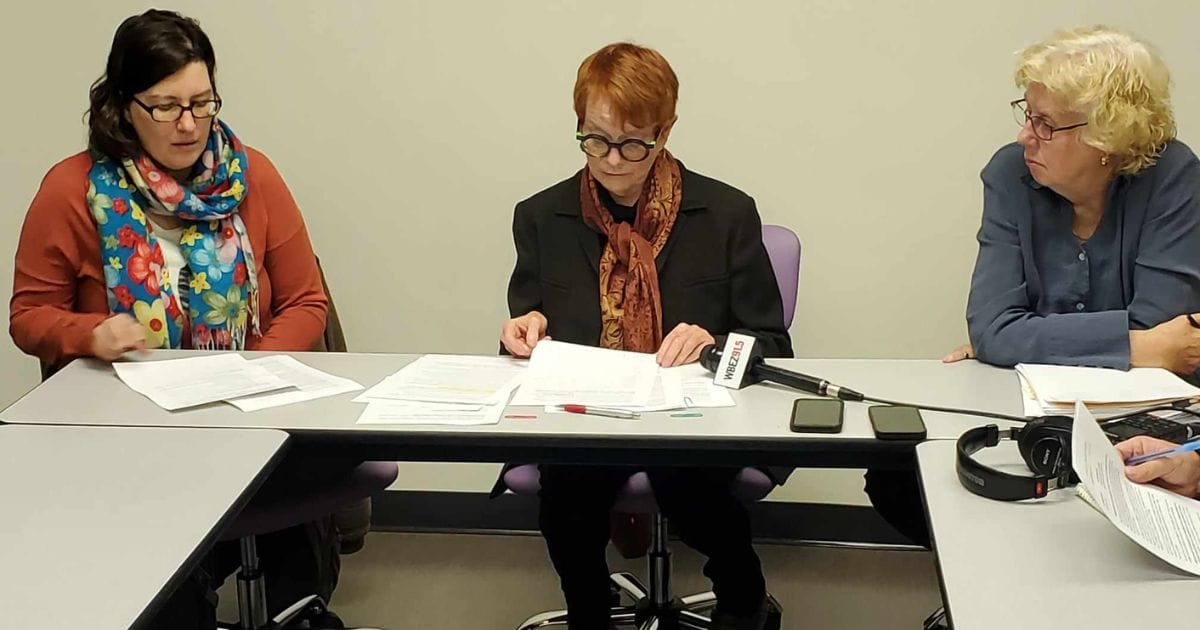GARY ADVOCATES FOR Responsible Development (G.A.R.D.) members seated at the table share environmental news and information with the public about their efforts to stop Fulcrum Bioenergy from polluting Northwest Indiana. (Photo by Ted Brown)
Gary residents have formally requested that a judge revoke Fulcrum Bioenergy’s air permit for its Centerpoint facility. In a motion for “summary judgement,” filed Monday with the Indiana Office of Environmental Adjudication (IOEA), Gary residents argue that the Indiana Department of Environmental Management (IDEM) failed to substantiate, as required by law, claims by the company that the plant will be a minor source of pollution and not a threat to public health and that, therefore, the permit should be revoked.
“According to Fulcrum’s own estimates, its Centerpoint plant could emit over 1,400 tons of volatile organic compounds and nearly 1,200 tons of particulates – far in excess of the regulatory thresholds for being considered a “major source” under the Clean Air Act (CAA). Yet, based on Fulcrum’s wholly unsupported emissions calculations, IDEM concluded that Fulcrum’s biorefinery would be a “minor source” of emissions and subject to a lower level of regulation,” said Dorreen Carey, a petitioner, and President Gary Advocates for Responsible Development (GARD).
On April 10, 2021, Fulcrum Centerpoint applied to IDEM for a Federally Enforceable State Operating Permit (FESOP) for a biorefinery to be located at 6200 Industrial Highway in Gary, Indiana. Facilities operating with FESOPs avoid the more burdensome requirement the CAA imposes on “major” hazardous air polluters.
The motion for summary judgment charges that “IDEM’s decision to issue the FESOP to Fulcrum was not based on substantial evidence and violates the Clear Air Act in at least three respects.
1. IDEM had no specific information about the composition of Fulcrum Centerpoint’s feedstock and therefore lacked substantial evidence to accurately determine and regulate the plant’s hazardous emissions. To determine whether a plant’s emissions qualify for a FESOP, the Clean Air Act requires that FESOP applicants provide information about the types, quantities and characteristics of the fuels that will be used.
Fulcrum proposes to use trash from landfills (municipal solid waste or MSW), the composition of which can vary greatly and includes many hazardous substances. However, Fulcrum’s FESOP application to IDEM offered no information that even generally characterized the makeup of the feedstock it would use.
In a deposition, IDEM Senior Environment Engineer Jenny Acker stated: “I don’t know what’s in their feedstock exactly.”
Without knowing or establishing enforceable limits on the types and quantities or percentages of materials found in the MSW that Fulcrum will use in its feedstock, IDEM failed to obtain even the minimum information needed to establish whether the plant qualified for a FESOP or not.
2. IDEM did not adequately scrutinize Fulcrum’s unsupported emissions claims or independently verify Fulcrum’s emissions calculations. Air emissions at the Centerpoint plant will come from several different sources: 1) three feedstock storage units; 2) feedstock dryers and associated bughouses; 3) silos and hoppers; 4) the wastewater treatment system; and 5) flares.
Applicants seeking a FESOP are required to provide emission rates for all pollutants at all sources and the calculation methods on which the emissions estimates are based. Indiana’s permitting regulations also require IDEM to meticulously review Fulcrum’s proposed emissions factors and confirm that they are supported by reliable calculation methods and data.
Despite these requirements, IDEM only relied on unsupported statements from Fulcrum for every emissions source when calculating Centerpoint’s potential to emit (PTE) above “major source” thresholds.
3. IDEM lacked substantial evidence to support the finding that Fulcrum’s air permit is protective of human health. Indiana’s air permitting regulations require IDEM to reject construction of any new emissions source if the terms and conditions of the preconstruction approval are not protective of human health.
IDEM found that Fulcrum’s FESOP satisfied all federal health- and technology-based standards including national ambient air quality standards (NAAQS). This evaluation of Fulcrum’s impact on public health fell short in several ways.
• Despite conducting a flawed emissions modeling process, IDEM’s own analysis demonstrated that the Fulcrum facility would violate NAAQS in Lake County.
• IDEM’s NAAQS analysis also failed to consider the impact Fulcrum’s nitrogen oxide (NOx) and volatile organic compound (VOCs) emissions – ozone precursors – will have on ozone levels, which have been increasing in recent years.
• IDEM did not consider the fact that the public most likely to be affected by Fulcrum’s emissions is already overburdened with pollution exposure and have the health disparities to show for it, and therefore, would require a greater level of protection from pollution.
Gary Residents filed a petition with the Indiana Office of Environmental Adjudication in December 2022 seeking a revocation of a permit issued by IDEM to Fulcrum for its Centerpoint plant in Gary, Indiana. In the intervening period, lawyers for both parties have reviewed documents and taken depositions relevant to the case.
GARD is represented by Kim Ferraro, Senior Attorney, Conservation Law Center, and Michael J. Zoeller, Senior Attorney, Environmental Law Policy & Center.
Gary Advocates for Responsible Development (GARD) is an ad hoc group of Gary residents and regional supporters advocating for a healthy and sustainable future in Gary.






